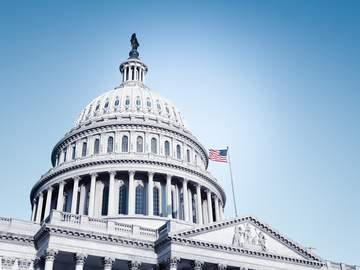
Is the United States a democracy? Or is it actually a republic? The short answer is that it’s both. How and why that’s true is worth exploring.
Democracy and republic both refer to government in which supreme power resides in its citizens. This was the important distinction at the time of the founding of the United States, as such a government is in direct contrast with monarchy, in which supreme power belongs to the king or queen alone. In part because that context was clear to everyone involved in the American Revolution, democracy and republic were used interchangeably in the late 1700s. Both words meant that the power to govern was held by the people rather than a monarch, as in England.
This shared meaning persists, but the words are distinct, as their historical uses and etymologies demonstrate. Democracy comes from a Greek word meaning “rule by the people,” and in its original use it referred to what is also called a direct democracy, as in ancient Greece. In a direct democracy, the people vote directly against or in favor of each decision, policy, law, etc. Direct democracies today are very rare, as requiring that each decision, policy, law, etc., be voted on by all the people becomes extraordinarily complicated when you have a population of any significant size. Today most democracies (including the United States) are representative democracies, in which elected representatives vote in the people’s stead. Note that both direct democracies and representative democracies are considered democracies: they are both government by the people.
Republic comes from a Latin word that can be translated as “public good” and “public affair,” and was used in ancient Rome to mean simply “state” or “country” with reference to the representative democracy of the Roman Republic. The elected representatives in Congress are a contemporary example of this kind of government.
Because democracy is an abstract name for a system and republic is the more concrete result of that system, democracy is frequently used when the emphasis is on the system itself. We could say that democracy is to republic as monarchy is to kingdom.
Neither democracy nor republic is mentioned in the Declaration of Independence, a document that nevertheless expresses clearly that governments should be established “deriving their just powers from the consent of the governed.” Those words read like a definition of both democracy and republic. In Article IV Section IV of the Constitution, the term republican is used as an adjective in its “relating to a republic” meaning: “The United States shall guarantee to every State in this Union a Republican Form of Government.”




